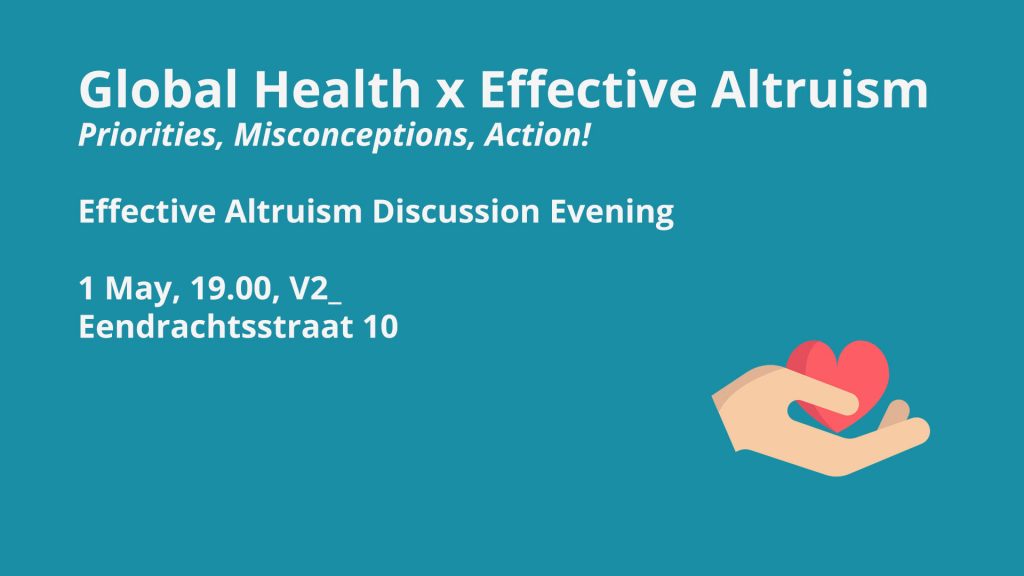Global Health x Effective Altruism

On Wednesday 1st of May 2019, the EA Rotterdam group had their eight reading & discussion group. This is a deeper dive into some of the EA topics.
Please join us at our next meetup on the 3rd of July!
How you can make better decisions!
The topic for this event was Global Health x Effective Altruism: Priorities, Misconceptions, Action!
During the evening we discussed what was happening in in Global Health and how looking through an Effective Altruism (EA) lens we could find out how we could do the most good. After a presentation by the team members of EA Rotterdam we engaged in a round-table discussion.
Here are the presentation, questions, reading materials, and my personal summary of the event.
We (the organisers of EA Rotterdam) thank Alex from V2_ (our venue for the night) for hosting us.
If you want to visit an EA Rotterdam event, visit our Meetup page.
Presentation
We started the evening with a presentation by Laurin, Joeri and Christiaan. They respectively introduced EA, what things are happening in Global Health (and which misconceptions we might still have), and a bit of critique on where to focus (why not mental health?).
At the end of the presentation, Floris (me) laid some factors to think about. This included the outcomes, different causes and criteria for measuring them (download the questions).
Round-table Discussion
We talked about the difficulty of comparing different charities and outcomes, even within the field of Global Health. Would it be better for 100 people to go from a happiness/life-satisfaction score of 5 to 8 (300 ‘points’) or to save 10 lives which will have a score of 6 (60 ‘points’). Some (total utilitarians) would argue for the former, others might have an instinctual feeling we need to focus on the latter.
Related was the topic of saving versus improving lives. One could argue that malaria bednets mainly focus on saving lives. Yet at the same time they also improve the lives of many. They prevent suffering for parents and children. They prevent someone from being ill many times over. They improve economic and societal outcomes.
We asked if you could compare happiness and suffering. We quickly realised that they are not two sides of the same coin. In many cases, we prefer to prevent suffering over adding the same (if it can be compared) happiness. See more on happiness in the Stanford Encyclopedia.
The group discussed many more topics and I recommend that you use the questions to start your own conversation (why not one at the dinner table).
Conclusion
It was another great evening that we got to host at V2_. We can’t thank Alex enough for hosting us there and for everyone who was at the event. We hope to see you at one of the next ones:
Wednesday 3rd of July – Improve your (institutional) decision making
September (to be announced) – Eating Ethically
November (to be announced) – EA Career Advice
Resources
Videos
Peter Singer – The why and how of Effective Altruism
Will MacAskill – What are the most important moral problems of our time?
Research/Articles
https://www.givewell.org/charities/top-charities
Charities recommended by Give Well (EA research organization)
https://www.effectivealtruism.org/articles/cause-profile-global-health-and-development/
Profile on why Global Health and Development is a cause to fight for
https://80000hours.org/career-guide/world-problems/
World’s most pressing problems and your career
Our updated top charities for giving season 2018
Top Charities recommendation 2018 update by Give Well
Giving Season 2018 large decision Google Sheet
How to use a spreadsheet to make good (giving) decisions
https://www.givewell.org/how-we-work/our-criteria/cost-effectiveness/comparing-moral-weights
How to use moral weights
Podcasts:
https://samharris.org/podcasts/being-good-and-doing-good/
Will MacAskill on Sam Harris’ podcast, on being and doing good
https://80000hours.org/podcast/episodes/james-snowden-givewell-research/
James Snowden on how GiveWell chooses the best charities